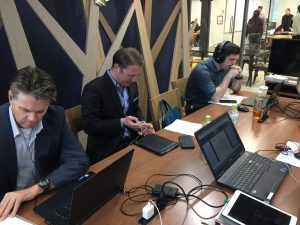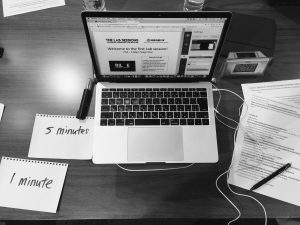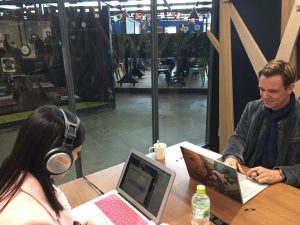Evaluating autonomous language learning
November 16th, 2017
2.50pm – 5pm (Tokyo time)
A big THANK YOU to everyone who participated in our first LAb session. Please scroll down to see the presenter’s details below to find links to the recordings and slides.

Paul, Mike and Curtis getting set up

T-6

Ellie and Hayo testing
In this first LAb session, we are interested in exploring ways in which we might identify and evaluate autonomy in language learning, or particular aspects or dimensions of it. An angle we might explore, for example, is whether there are identifiable characteristics amongst more autonomous learners which could be encouraged and promoted in less autonomous learners. Or, we could look at the ways in which we might be able to measure or evaluate whether our endeavours to promote autonomy (e.g. in classrooms and self-access centers) have been successful. Are there tools with which we might be able to assess or evaluate particular aspects or dimensions of autonomy? Many such approaches, which aim to describe processes and understand our learners, are likely to use qualitative methods; however, there may be merit in adapting tools from psychology or the social sciences in order to evaluate autonomy in language learning in alternative ways.
1. Presentations
Carol J. Everhard, (formerly) Aristotle University, Greece
Re-exploring the relationship between autonomy and assessment in language learning
Recording | Slides | Reference list
Abstract
The relationship between autonomy and assessment is of interest since the degree of autonomy language learners enjoy would seem to be directly related to the system of assessment in place. The greater the ‘self’ is involved in the assessment process, the greater the degree of autonomy. Also of interest is whether autonomy itself can, in some way, be measured or assessed. Clearly, the way in which such a system of assessment might be put into practice and exploited would need to be carefully monitored and controlled.
Bio
Carol J. Everhard has conducted research on the role of assessment in promoting autonomy and is particularly interested in how the use of peer- and self-assessment processes can encourage autonomy. She has been responsible for establishing and developing facilities for self-access language learning (SALL) for the British Council, Greece and for the School of English, Aristotle University of Thessaloniki, Greece. With a strong interest in peer dynamics and how it can assist in the discovery and development of the self, Carol has exploited both peer-mentoring and peer-assessment as platforms and approaches in promoting autonomy and self-access learning. Her publications include a volume, co-edited with Linda Murphy, entitled ‘Assessment and autonomy in language learning’, published with Palgrave Macmillan in 2015.
Ellie Law, University of Hong Kong
How can the development of learner autonomy be evaluated in an Academic English Course context?
Recording | Slides
Abstract
In this presentation, I discuss a few measurement tools that can be used to evaluate the development of learner autonomy in the context of an academic English course. My discussion will be based on a study I conducted in an academic English course which has a self-access language learning (SALL) component at a Hong Kong university. First, asking students to define learner autonomy and comparing their definitions given at the beginning and end of the course was found to be an effective way to evaluate the development of students’ metacognitive awareness. Second, the study shows that evidence of learner autonomy and students’ different autonomous development trajectories can be identified from the data collected from periodic individual interviews with the students and their SALL progress reports and SALL reflections during the English course.
Based on the empirical data collected from the study, I developed a 4-level model of learner autonomy which operationalises the autonomy construct and enables researchers and SALL practitioners to measure the level of learner autonomy of an individual at a specific time and to describe the changes in the level of learner autonomy of an individual over time.
Bio
Ellie Law is a lecturer at the Centre for Applied English Studies, The University of Hong Kong. She has recently completed a PhD in Applied Linguistics. Her thesis is entitled “Promoting learner autonomy through a self-access language learning (SALL) component of a taught English course”.
Paul Moore, University of Queensland, Australia
Explicating and evaluating learner autonomy and interdependence in face-to-face and technology-mediated contexts – Concepts for qualitative analysis.
Recording | Slides
Abstract
This talk explicates the concepts of framing, intersubjectivity and control, as they relate to research into learner interaction in tasks which originate in, but transgress the boundaries of, the language classroom. Drawing on perspectives from sociocultural theory and interactional sociolinguistics, as well as recent theory and research into technology-mediated interaction, I outline the potential for qualitative methodologies to assist in bridging the gap between the classroom and other contexts for learning, with a focus on implications for the evaluation of learner autonomy-in-interaction.
Bio
Paul Moore lectures in Applied Linguistics in the School of Languages and Cultures, University of Queensland, where he is also the convenor of the Master’s Dissertation and Chief Examiner. Paul’s main research interest involves the dynamic influence of learners, tasks and sociocultural context on task-based interaction, performance and development. He is currently revisiting his interest in the role of technology in mediating learning inside and outside the classroom.
2. Interview
Maria Giovanna Tassinari, Freie Universität Berlin, Germany
An interview with Giovanna about her dynamic model for assessing autonomy
Interviewer: Curtis Edlin, Kanda University of International Studies, Japan
| Recording |
Bio
Maria Giovanna Tassinari is Director of the Centre for Independent Language Learning at the Language Centre of the Freie Universität Berlin, Germany. Her research interests are learner autonomy, language advising, and affect in language learning. She is co-editor of several books and author of articles and chapters in German, English and French.
Tassinari, M. G. (2010). Autonomous foreign language learning : Components, competences, strategies . Frankfurt am Main: Lang. http://www.sprachenzentrum.fu-berlin.de/slz/lernberatung/autonomiemodell/index.html
Tassinari, M. G. (2012). Evaluating learner autonomy: A dynamic model with descriptors. Studies in Self-Access Learning Journal, 3(1), 24-40. retrieved from https://sisaljournal.org/archives/march12/tassinari/
3. Short sessions
Michael Burke, Kanda University of International Studies, Japan
Short introduction to the Perceived Choice and Awareness of Self Scale.
Audio recording | Instrument
Satoko Watkins, Kanda University of International Studies, Japan
Short introduction to the SILL Strategy Inventory.
Audio recording | Instrument
Huw Davies, Kanda University of International Studies, Japan
Revisiting Rebecca Oxford’s Teaching and Researching Language Learning Strategies.
Audio recording | Book
Programme
•Introduction by Hayo Reinders and Jo Mynard
•Presentation by Carol Everhard
•Short introduction to the Perceived Choice and Awareness of Self Scale by Michael Burke
•Presentation by Ellie Law
•Interview with Giovanna Tassinari by Curtis Edlin
•Short introduction to SILL (strategy inventory) by Satoko Watkins
•Revisiting Rebecca Oxford’s Teaching and Researching Language Learning Strategies by Huw Davies
•Presentation by Paul Moore
•Summary and wrapping up by Jo & Hayo
